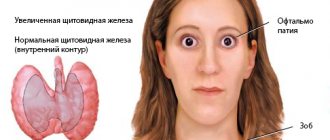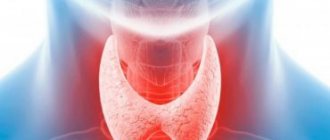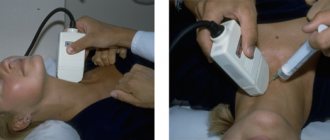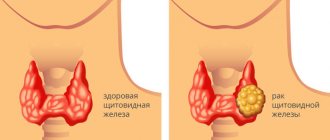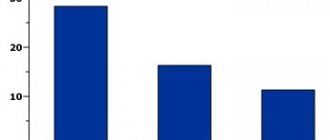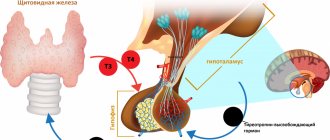Hypothyroidism (Underactive Thyroid) is a condition in which the body does not have enough hormones produced by the thyroid gland. Since the main purpose of thyroid hormone is to control the body's metabolism, it is understandable that patients with hypothyroidism will have symptoms associated with a slow metabolism.
Appointment with an endocrinologist - 1000 rubles. Comprehensive ultrasound of the thyroid gland - 1000 rubles. Appointment based on ultrasound or test results - 500 rubles (optional)
CLICK TO MAKE AN APPOINTMENT or ultrasound tests
Statistics give different figures, but it is known that several million Russians suffer from hypothyroidism to varying degrees. Up to 10% of women have some degree of thyroid deficiency. Since the disease is almost asymptomatic at first, many people are not even aware of the problem that is gradually destroying the body.
Symptoms of hypothyroidism
The signs of the disease - hypothyroidism - are familiar to many, but are almost always ignored due to their similarity to minor ailments. With thyroid insufficiency, the patient is characterized by:
- Fatigue, weakness.
- Weight gain or difficulty losing weight.
- Dry, hard, brittle hair.
- Dry, rough, pale skin.
- Hair loss.
- Brittleness and layering of nails.
- Intolerance to cold and cold water.
- Muscle cramps and frequent muscle pain.
- Constipation, as the thyroid gland stimulates the intestines.
- Depression, irritability.
- Memory loss.
- Failure of the menstrual cycle.
- Decreased libido.
Each individual patient may have a different combination of symptoms, and these vary depending on the severity of the thyroid deficiency and the period during which the body has been deprived of the required amount of the hormone. Some people with hypothyroidism have no symptoms at all, or they are so mild that they go undetected for a very long time.
Forms and causes of the disease
Hypothyroidism is often called a disease of megacities: due to poor environmental conditions and the lack of iodine prophylaxis, it is more common in large cities than in rural areas. The disease affects people of different social status and gender. However, it is 5 times more common in women. The patient’s age is also important: after 40 years, the likelihood of developing an endocrine disorder increases.
How thyroid hypothyroidism manifests itself can be determined by its form:
- primary;
- secondary;
- tertiary
The primary form of pathology is a condition that develops as a result of damage to the thyroid gland. It is characterized by an increase in the production of a hormone called thyroid-stimulating hormone. It develops due to autoimmune disorders, as well as due to previous drug treatment of diffuse and diffuse nodular goiter, or iodine deficiency. There is also congenital hypothyroidism, most often caused by insufficient development of the thyroid gland.
The secondary form is the result of damage to the hypothalamic-pituitary system, that is, individual areas of the brain, in which the production of TT is disrupted and thyroid function deteriorates.
There is information about the tertiary form of hypothyroidism that it is a consequence of pathological lesions of the hypothalamus. Both of these forms develop due to injuries, surgery, tumors and other conditions that provoke disturbances in the functioning of the hypothalamus or pituitary gland.
Potential danger of hypothyroidism, prognosis for cure
Since the body needs a certain amount of thyroid hormones, when there is a deficiency, the pituitary gland begins to produce additional thyroid-stimulating hormone (TSH). So he tries to stimulate the weakened thyroid gland. Constant bombardment with high levels of TSH causes the thyroid gland to enlarge and form a goiter, called a “compensatory goiter.” If left untreated, the symptoms of hypothyroidism progress. Complications can lead to severe life-threatening depression, heart failure, or coma. Hypothyroidism can often be diagnosed with a simple blood test for thyroid hormones. In some cases, more detailed tests are necessary. Which ones are decided by the endocrinologist? The same doctor refers you to an ultrasound of the thyroid gland - a mandatory examination for any pathologies of this organ.
Early diagnosed hypothyroidism is completely treatable in many patients. In this case, no complex procedures are required - just take the pills selected by the endocrinologist once a day.
Causes of hypothyroidism in women
Hypothyroidism is most often diagnosed in patients over 40 years of age. The hereditary factor matters. If one of your close relatives has been diagnosed with a similar disease, then these patients are at increased risk. Primary hypothyroidism can manifest itself mildly, moderately or severely. The reasons for its appearance lie in iodine deficiency, congenital pathologies of the thyroid gland, and diffuse toxic goiter. Autoimmune thyroiditis is also possible - a case when endocrine disorders occur due to a malfunction of the immune system.
Secondary and tertiary hypothyroidism can be caused by injuries, chronic diseases, radiation, and surgeries. The risk of disease is high with brain tumors and decreased pituitary function. These pathologies require regular endocrine monitoring.
Diagnosis of hypothyroidism
Since hypothyroidism is associated with a deficiency of thyroid hormones secreted by the thyroid gland, the diagnosis of hypothyroidism is based on measuring the amount of thyroid hormones in the blood. There are normal ranges for all thyroid hormones, which scientists have calculated based on studies of tens of thousands of people. If the level is below normal, this indicates the presence of hypothyroidism. Hormone tests are very accurate, reliable and accessible to everyone.
The point of the tests is to measure the levels of hormones - T4 and TSH. In a person with an underactive thyroid, T4 (the main thyroid hormone) levels will be low and TSH levels will be high. This means that the thyroid gland is not producing enough hormones, and the pituitary gland, recognizing the deficiency, responds by increasing the production of thyroid stimulating hormone (TSH).
In rare cases, in hypothyroidism caused by pituitary deficiency, T4 thyroid hormone levels will be low and TSH levels will also be low. The thyroid gland in this case is healthy, but behaves this way because it can only produce hormone in response to TSH signals from the pituitary gland.
In most people, hypothyroidism can be easily diagnosed with simple blood tests. In patients with moderate symptoms, the disease is more difficult to detect.
This is due to several factors:
- There are many degrees of this disease from very severe to very mild.
- Different reactions of the body of patients to the same degree of illness.
- The degree of thyroid hormone abnormalities often, but not always, correlates with the degree of symptoms.
If there are symptoms of hypothyroidism, but the tests are good, you need to continue the examination. Normal blood levels of thyroid hormones have a fairly wide range that may not be appropriate for some patients.
For most patients with hypothyroidism, simple treatment with hormone replacement is enough to return all thyroid functions to the normal range and improve their well-being. For some patients, it will be necessary to select treatment, achieving a positive result gradually. In this case, you will have to constantly undergo tests and ultrasounds.
Hypothyroidism is a disease of the endocrine system characterized by a lack of thyroid hormones. These hormones regulate metabolism, affect the emotional background, and the body’s resistance to stress and stress.
A lack of thyroid hormones can lead to serious health problems: disrupt the functioning of the heart and kidneys, cause obesity, reduce immunity, and lead to infertility. Hypothyroidism most often manifests itself in adulthood, mainly in women. Slow development of the process is the main reason for late detection of the disease. Patients rarely attach importance to such initial symptoms as lethargy, apathy or forgetfulness, attributing them to overwork and lack of vitamins.
Despite the fact that laboratory diagnosis of hypothyroidism is not difficult, most patients consult a doctor already at the stage of development of complications that require additional treatment. A severe form of hypothyroidism is called myxedema. It can be avoided by taking synthetic hormonal drugs in a timely manner. Their dose is selected by an endocrinologist based on laboratory tests.
Synonyms Russian
Gall's disease, hypothyroidism, myxedema.
English synonyms
Hypothyroidism, Myxedema.
Symptoms
Clinical manifestations of hypothyroidism largely depend on the severity of hormonal deficiency and are quite varied. The process develops slowly and takes several years. If left untreated, the condition may worsen. In severe, advanced cases, a coma develops (myxedema coma).
Hypothyroidism is manifested by the following symptoms:
- lethargy and apathy;
- muscle weakness and muscle pain;
- stiffness and pain in the joints;
- pale, dry skin;
- swelling;
- brittle nails and hair;
- increased cholesterol levels;
- unexplained weight gain;
- increased sensitivity to cold, chilliness.
General information about the disease
The thyroid gland is one of the most important glands of the endocrine system. It is located on the front surface of the neck and consists of two lobes that, in the form of butterfly wings, cover the trachea. The hormones produced by the thyroid gland, thyroxine (tetraiodothyronine, or T4) and triiodothyronine (T3), are involved in the regulation of almost all metabolic processes in the body. Iodine is required for their formation.
Insufficient iodine intake from food is one of the main causes of hypothyroidism. This is common in countries where seafood consumption is low.
Other reasons include:
- autoimmune thyroid diseases (Hashimoto's autoimmune thyroiditis);
- previous operations on the thyroid gland;
- radiation therapy;
- taking certain medications that have a toxic effect on the thyroid gland.
Rarer causes include:
- congenital underdevelopment of the thyroid gland and pituitary gland;
- severe toxicosis and hypoxia in pregnant women.
To establish the cause of thyroid hormone deficiency, an endocrinologist needs to conduct a thorough examination.
Thyroid hormones are involved in the regulation of fat and carbohydrate metabolism, thereby affecting body weight, providing thermoregulation of the body and even affecting heart rate. A deficiency or excess of thyroid hormones can significantly change a person’s appearance, behavior and emotional background.
The third thyroid hormone, calcitonin, regulates calcium levels in the blood.
Thyroxine and triiodothyronine are synthesized by the thyroid gland under the influence of thyroid-stimulating hormone from the pituitary gland, which is located at the base of the brain and is the main regulator of the thyroid gland. The signal for the production of thyroid-stimulating hormone is a decrease in the levels of T3 and T4 in the blood. In this way, the chemical relationship between the endocrine glands is carried out. Disruption of this relationship can lead to insufficient thyroid function and secondary hypothyroidism.
There is also tertiary hypothyroidism. It occurs when the hypothalamus, the center of endocrine regulation of the entire organism, located in the brain, does not work properly.
Who is at risk?
- Women over 50 years old.
- Persons living in areas with iodine deficiency.
- Residents of areas with increased background radiation, as well as those exposed to radionuclide contamination.
- Persons suffering from autoimmune diseases or having close relatives with this pathology.
- Previously operated on due to pathology of the thyroid gland.
- Have been treated with radioactive iodine or have undergone radiation therapy to the neck area.
Diagnostics
Diagnosis of hypothyroidism is quite simple and involves determining the level of thyroid hormones. Significant difficulties can arise in identifying the causes of hypothyroidism, especially its second and third types.
General clinical studies
- Complete blood count (without leukocyte formula and ESR). Impaired absorption of iron is one of the manifestations of hypothyroidism. A general blood test may show a low hemoglobin level with a normal or reduced number of red blood cells (anemia).
- A biochemical blood test reflects the consequences of disorders of water-salt and fat metabolism. With severe hypothyroidism, sodium levels may decrease, creatinine levels may increase, and, in some cases, liver enzymes.
Tests confirming low thyroid hormone levels
- Thyroid-stimulating hormone (TSH) is a pituitary hormone. Its elevated level may indicate decreased thyroid function. The results are taken into account under the condition of normal pituitary function. If low levels of TSH and thyroid hormones are simultaneously detected in the blood, secondary hypothyroidism can be suspected.
- Total and free triiodothyronine (T3). A reduced level of free T3 in the blood is important.
- Total and free thyroxine (T4). The level of this hormone is also reduced in hypothyroidism.
- Thyroxine-binding proteins (t-uptake). This test is designed to identify proteins that transport thyroid hormones to organs and tissues. The percentage of free and bound transport proteins can be determined by laboratory testing. In hypothyroidism, it is shifted towards free (not associated with the hormone) proteins.
- Serum cholesterol. Hypothyroidism is characterized by an increased concentration of cholesterol.
To exclude the autoimmune nature of hypothyroidism, tests are performed for:
- ATTG – antibodies to thyroglobulin, a protein that is the basis for the production of thyroid hormones;
- ATTPO – antibodies to thyroid peroxidase, a protein found only in thyroid cells; The level of these antibodies may be increased in autoimmune diseases.
Additional Research
The scope of additional examination is determined by the attending physician in each specific case.
- Ultrasound examination of the thyroid gland allows you to assess the size and structure of the gland and identify focal formations in it.
- A radioisotope study shows the ability of the gland to accumulate iodine, the size of the gland, and the presence of space-occupying lesions.
- Puncture biopsy - study of the cellular composition, in case of nodular lesions - exclusion of a malignant nature.
- Electrocardiogram. In the later stages of hypothyroidism, there are changes on the ECG.
- Chest X-ray reveals an increase in heart size.
Treatment
Treatment for hypothyroidism involves taking medications containing synthetic thyroid hormones. The endocrinologist selects the required dose based on the level of hormones in the blood. If the autoimmune nature of hypothyroidism is confirmed, the underlying disease is treated.
Prevention
The basis for preventing hypothyroidism is replenishing iodine deficiency in the body: eating iodized salt and seafood.
Recommended tests
- Antibodies to TSH receptors (anti-pTTH)
- Antithyroglobulin antibodies (antiTG)
- Antibodies to thyroid peroxidase (anti-TPO)
- Serum calcitonin
- Thyroglobulin
- Thyroid-stimulating hormone (TSH)
- Free thyroxine (free T4)
- Total thyroxine (T4)
- Total triiodothyronine (T3)
- Free triiodothyronine (free T3)
- Cholesterol – high density lipoprotein (HDL)
- Cholesterol – low density lipoproteins (LDL)
- Total cholesterol
Treatment of hypothyroidism
Hypothyroidism in the initial stages is quite easy to treat. In this case, drug hormonal therapy is usually used. A tablet containing a thyroid hormone substitute is taken once in the morning, on an empty stomach.
The drug is a pure synthetic form of T4, completely identical to the body hormone T4 secreted by the human thyroid gland. The advantage of the technique is the ability to select the ideal dosage of the drug.
While treatment is ongoing, it is necessary to donate blood for hormones monthly until the appropriate level is established in the body. Then the dose of the drug is reviewed at least once a year.
Some patients notice improvement within 1-2 weeks, but a full metabolic response to thyroid hormone therapy is not possible until after one to two months.
Risk factors
- Women during pregnancy.
- Women over 60 years of age.
- Persons who have relatives with thyroid diseases.
- Patients after thyroid surgery.
- Having autoimmune diseases (rheumatoid arthritis, Libman's disease, type 1 diabetes).
- Patients who have been treated with radioactive iodine, antithyroid drugs, or irradiation of the neck or chest area.
- Living in areas with increased background radiation.
The syndrome can occur in any person, but the likelihood of its development increases with age. Iodine deficiency also has a negative effect. This trace element is necessary for the production of thyroid hormones. According to WHO, about 85% of Russians live in areas with iodine deficiency. The element is lacking in the soil and, as a result, in grown vegetables and fruits.
Why you can’t treat hypothyroidism on your own and how long will treatment last?
It is very important that the patient takes the correct amount of hormones, which is impossible without high-quality diagnostics and consultation with an endocrinologist.
- If the dosage is insufficient, fatigue and other symptoms of hypothyroidism will persist.
- Too high a dose will cause nervousness, insomnia and other symptoms characteristic of hyperthyroidism (excess hormones).
- New research shows that too much thyroid hormone causes calcium to be lost from bones, increasing the risk of osteoporosis.
The correct dosage is especially important for patients with heart disease. Even a slight excess of thyroid hormones increases the patient's risk of heart attack and causes angina. Heart patients need to be tested more often than other patients. Hormone levels in the blood are measured after a month of treatment to determine whether the dosage of the medication is appropriate for the patient. Often blood samples are also tested for the presence of anti-thyroid antibodies, a sign of autoimmune thyroiditis, as this is the most common cause of hypothyroidism. Unfortunately, treatment will be lifelong.
Treatment at the clinic “Mom, Dad, Me”
The network of family clinics “Mom, Dad, Me” invites everyone to check their hormonal levels and, if necessary, consult an endocrinologist. Our advantages:
- a large number of branches in Moscow and other cities;
- quick and accurate laboratory diagnosis of hypothyroidism;
- consultation with a highly qualified endocrinologist;
- selection of an individual diet;
- the possibility of treating children, adults, pregnant women, and the elderly in one clinic;
- affordable prices for all medical services.
In order to take a blood test or get a doctor’s consultation, we suggest calling the phone number listed on the website or making an appointment through a special form.
Reviews
Good clinic, good doctor!
Raisa Vasilievna can clearly and clearly explain what the problem is. If something is wrong, she speaks about everything directly, not in a veiled way, as other doctors sometimes do. I don’t regret that I ended up with her. Anna
I would like to express my gratitude to the staff of the clinic: Mom, Dad, and me. The clinic has a very friendly atmosphere, a very friendly and cheerful team and highly qualified specialists. Thank you very much! I wish your clinic prosperity.
Anonymous user
Today I had a mole removed on my face from dermatologist I.A. Kodareva. The doctor is very neat! Correct! Thanks a lot! Administrator Yulia Borshchevskaya is friendly and accurately fulfills her duties.
Belova E.M.
Today I was treated at the clinic, I was satisfied with the staff, as well as the gynecologist. Everyone treats patients with respect and attention. Many thanks to them and continued prosperity.
Anonymous user
The Mama Papa Ya clinic in Lyubertsy is very good. The team is friendly and responsive. I recommend this clinic to all my friends. Thanks to all doctors and administrators. I wish the clinic prosperity and many adequate clients.
Iratyev V.V.
We visited the “Mama Papa Ya” Clinic with our child. A consultation with a pediatric cardiologist was needed. I liked the clinic. Good service, doctors. There was no queue, everything was the same price.
Evgeniya
I liked the first visit. They examined me carefully, prescribed additional examinations, and gave me good recommendations. I will continue treatment further; I liked the conditions at the clinic.
Christina
The doctor carefully examined my husband, prescribed an ECG and made a preliminary diagnosis. She gave recommendations on our situation and ordered additional examination. No comments so far. Financial agreements have been met.
Marina Petrovna
I really liked the clinic. Helpful staff. I had an appointment with gynecologist E.A. Mikhailova. I was satisfied, there are more such doctors. Thank you!!!
Olga
Contraindications for hormonal therapy for hypothyroidism
Synthetic T4 can be taken safely with most other medications. Caution should be exercised when combining the drug with cholestyramine (a compound used to lower blood cholesterol levels) and medications prescribed against seizures and iron-containing vitamins.
You also need to be careful about the dosage of T4 substitute for pregnant women. During pregnancy, T4 doses must be adjusted and increased, since during this period the body requires more hormones. This is due to the acceleration of metabolism during pregnancy.
Reasons for development
In adults, with rare exceptions, acquired hypothyroidism is diagnosed. The main reasons for the development are:
- tumors of the hypothalamic-pituitary region;
- surgical intervention;
- radiation exposure.
Long-term insufficient intake of iodine from food increases the risk of the syndrome. Irregular, unbalanced diet, rare consumption of seafood.
Congenital hypothyroidism is caused by pathology of the thyroid gland. This includes hypoplasia, i.e. reduced volume of the gland with unchanged tissue, partial (aplasia) or complete absence (agenesis) of the thyroid gland or its isthmus. Over time, the mass of glandular tissue continues to decrease, and the production of hormones decreases. As a result, the pathology leads to serious illnesses and critically life-threatening conditions.
A lack of thyroid hormones during pregnancy is especially dangerous. According to medical statistics in Russia, 5% of pregnant women have reduced activity of the thyroid gland. This condition can negatively affect the development of the fetus. Hormones T3 and T4 are involved in all processes of maturation, development and growth of cells, tissues, and organs. Without correcting the condition, the risk of placental abruption, premature birth and delayed development of the child increases.
Recommendations for the prevention of hypothyroidism
To prevent the development of hypothyroidism, it is necessary to maintain a balanced diet. A person must get enough water, iodine, selenium and other nutrients.
Iodine is found in large quantities in seafood, seaweed, and walnuts. If it is not possible to include these products in your diet, you can replace them with iodine supplements and iodized salt.
Daily iodine intake according to WHO recommendations:
- children under 6 years old - 90 mcg;
- 7-12 years ー 120 mcg;
- adults and children over 12 - 150 mcg;
- pregnant and nursing mothers - 200 mcg.
Drug therapy
The prescription of drugs for fatty hepatosis largely depends on the cause of the disease. Treatment regimens may include:
- Hepatoprotectors;
- Vitamin complexes;
- Ursodeoxycholic acid preparations;
- Antihyperglycemic drugs for impaired glucose tolerance or diabetes mellitus;
- Lipid-lowering drugs;
- Antioxidants.
The prognosis for fatty liver disease is quite favorable, provided that you follow the diet and doctor’s prescriptions. Ignoring the problem can result in unpleasant complications, so it is better not to delay visiting the doctor.
Complications
If you ignore the disease, avoid treatment or do not receive it in full, this can lead to the following disorders:
- Damage to the nervous system, expressed in muscle weakness, pain in the limbs. Violation can lead to the development of carpal tunnel syndrome, gait and speech disorders.
- Suppression of kidney function, which means slower fluid removal, which leads to swelling.
- Heart rhythm disturbances and subsequent heart failure. An accumulation of fluid in the pericardium that compresses the heart, preventing it from making adequate heartbeats.
- Infertility in men and women. Hypothyroidism causes miscarriages, premature births and preeclampsia, a dangerous condition during pregnancy characterized by high blood pressure.
A life-threatening complication of hypothyroidism is hypothyroid coma. It is rare, primarily in the age category of citizens who have not been treated or received insufficiently qualified care. Clinical symptoms increase gradually. First, drowsiness is noted, bradycardia occurs, body temperature drops to +34 C. The patient is disoriented, is in a comatose state, does not respond to external stimuli, and may lose consciousness. Patients in hypothyroid coma require emergency care because they may die from cardiac tamponade, respiratory failure, and heart failure.
Correct and timely treatment will help to avoid complications of hypothyroidism. To do this, it is necessary to diagnose thyroid dysfunction as early as possible.
